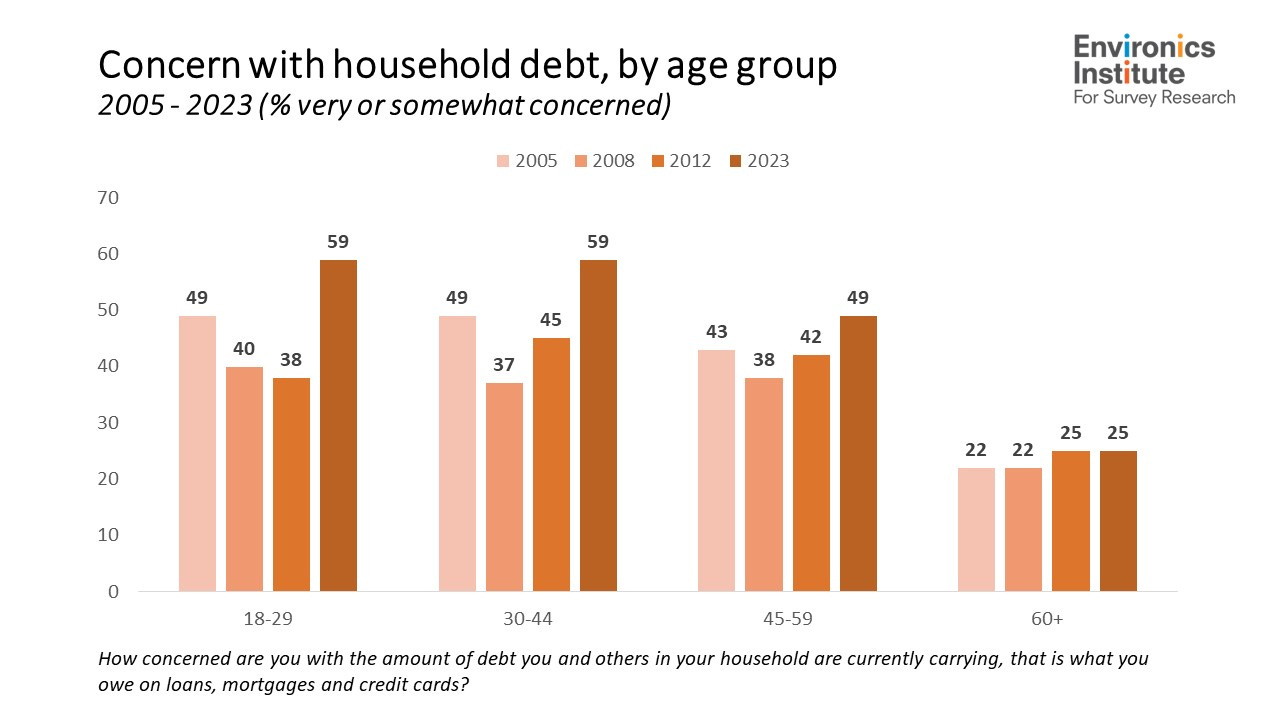Canadians’ growing concern with household debt
Guess who in our society is most likely to live rent- or mortgage-free?
There are a bunch of ways to measure how worried Canadians are about the economy. We can ask them which issue is most important (answer: inflation). We can ask them if their finances are doing better or worse than they were six months ago (“worse” outweighs “better” by almost three to one). Or we can ask them how worried they are about the amount of debt they’re carrying. Today’s post focuses on household debt.
Are Canadians really more worried than usual about the size of their loans, credit card bills and mortgages? In a word: yes.
Focus Canada asked Canadians about this on four occasions between 2004 and 2012. Each time, around two in five said they were very or somewhat concerned with the amount of debt their household was carrying. But when we re-asked this question this year, we found that proportion has risen to almost one in two.
Is that a big change? The proportion that was not concerned with their debt used to be about 20 percentage points higher than the proportion that was. Now, the proportions are about equal.
From here on in, I’ll focus on the change over the 15-year period between 2008, before the financial crisis hit, and today. Since 2008, the proportion of Canadians concerned with the amount of household debt they are carrying has increased by 13 points, from 34 percent to 47 percent.
But behind this overall change, there are two more important stories.
The first is about income. The level of concern about household debt is up across the board, among low-, middle- and high-income Canadians alike. For people following the housing issue, this won’t be a surprise. These days, a healthy salary is no protection from a daunting mortgage. But it is a finding worth emphasizing because of its potential political implications. Concern about debt is rising among people who otherwise should be feeling quite secure. That’s hardly a good backdrop for an election campaign.
The second story is about age. Concern about household debt is up among younger and middle-aged Canadians, but not seniors. And once again, the reason why is probably – you guessed it –housing.
The 2023 survey includes questions about whether you own or rent your home, and – for homeowners – whether you have a mortgage. The proportion concerned about household debt is similar between renters (57%) and homeowners with a mortgage (61%). But it is three times lower among homeowners without a mortgage (20%). This pattern makes sense, but here’s the key point: who in Canada owns their home, but makes no mortgage payments? You may think the answer is wealthy people, but that’s not quite right. The answer is older people. The average age of homeowners without a mortgage is 59, about 15 years older than that for the other two groups (renters and mortgage payers).
It's about generations, and really, about Boomers compared to everyone else. Older Canadians are more insulated from growing concern about debt because, on average, they are less likely to struggle with rising housing costs (I know there are many exceptions – we’re working with averages). In fact, for older Canadians who have paid off their mortgages, house price inflation increases their wealth.
Something to keep in mind as the public debate about housing affordability unfolds.
Results for 2004 to 2012 are from Environics’ Focus Canada surveys. Results for 2023 are from the Material Deprivation in Canada 2022-23 Phase 2 Survey (field dates: April 18 - May 17; sample size = 4,624), conducted by the Environics Institute for Food Banks Canada/Banques ailimentaires Canada. The author is solely responsible for any errors of presentation or interpretation.
What is the Environics Institute for Survey Research? Find out by clicking here.
Follow us on other platforms:
· Twitter: @Environics_Inst or @parkinac
· Instagram and Threads: environics.institute









Thanks for posting Andrew. This is very consistent witht the research we do for Sagen, which consistently shows that those who own their homes without a mortgage score the highest in terms of their Financial Fitness. Over the years, however, we are seeing growing numbers of older Canadians retiring with mortgage balances owning.
Interesting result for higher income Canadians.